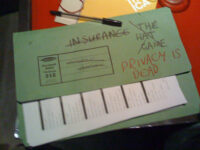The government’s inclusion of warrantless information demand powers in Bill C-2 may make this the most dangerous lawful access proposal yet, exceeding even the 2010 bill led by Conservative Public Safety Minister Vic Toews. The initial concern regarding the bill’s warrantless disclosure demand unsurprisingly focused on whether the proposal was consistent with Supreme Court of Canada jurisprudence upholding the reasonable expectation of privacy in basic subscriber information (there is a strong argument it is not). The application of this new power was generally framed as a matter for telecom and Internet companies, given that companies such as Bell, Rogers, and Telus are typically the focal point for law enforcement seeking information on subscriber activity. However, it has become increasingly apparent that this is an overly restrictive reading of the provision. The Bill C-2 information demand power doesn’t just target telecom providers. It targets everyone who provides services with the prospect of near limitless targets for warrantless disclosure demands.
News
Government Seeks To Exempt Political Parties From Privacy Laws Even As CRTC Reports They Are Leading Source of Spam Complaints
I have previously written about Bill C-4, legislation framed as an affordability measures bill, but which also exempts political parties from the application of privacy protections on a retroactive basis dating back to 2000. The provisions give political parties virtually unlimited power to collect, use and disclose personal information with no ability for privacy commissioners to address violations. Minister François Philippe Champagne has avoided mentioning the privacy provisions when discussing the bill and not a single Liberal MP has discussed it during House of Commons debates.
Government Remains Silent as it Eviscerates Political Party Privacy in Canada By Fast Tracking Bill C-4
The government is moving to eviscerate political party privacy in Canada as it fast tracks Bill C-4, proposed legislation framed as implementing affordability measures, but which also exempts political parties from the application of privacy protections on a retroactive basis dating back to 2000. The government moved to end second reading debate yesterday without a single Liberal MP speaking to the privacy provisions in the bill and is seeking to fast track hearings in the Senate so that it can be passed before Canada Day. The provisions give political parties virtually unlimited power to collect, use and disclose personal information with no ability for privacy commissioners to address violations. The bill drops earlier proposed requirements to disclose security breaches and restrict selling Canadians’ information and it blocks the application of provincial privacy laws. The bill’s provisions set a privacy standard for political parties (effectively limited to merely disclosing their privacy practices) that would be unthinkable for the private sector and establishes an unprecedented back-to-the-future approach of wiping out any potential accountability dating back decades.
Why the Government’s Plan for Warrantless Access to Internet Subscriber Information Will Lead to Millions of Disclosure Demands Each Year
The government’s plan for warrantless disclosure of Internet subscriber information is rightly attracting increasing attention as sneaking lawful access provisions into a border bill raises significant privacy concerns. As I pointed out last week, Bill C-2’s new “information demand” power – which can be used by a wide range of enforcement agencies over literally any potential offence of any Act of Parliament – is certain to spark a legal challenge given the Supreme Court of Canada’s previous decisions in Spencer and Bykovets. While the government has tried to paint the information at stake as “phone book” information with little privacy value, the reality is far different. The information demand includes whether the provider provides or has provided services to a particular subscriber or client, or to any account or identifier, whether there is transmission data on hand (who was the person communicating with and what apps were they using) as well as where and when the service was provided. The information demand can also cover when service began, when it ended, and what other communications services are used by the subscriber. The specific content would require a warrant, but all of this data, which can be very revealing, would be available without judicial oversight. Further, providers would be prohibited from disclosing the disclosure for a year and would receive legal immunity if they voluntarily provide the information without even requiring an information demand request.
What Is With This Government and Privacy?: Political Party Privacy Safeguards Removed in “Affordability Measures” Bill
Fresh off Bill C-2 and lawful access provisions buried in a border safety bill, the government has now quietly inserted provisions that exempt political parties from the application of privacy protections in Bill C-4, an “affordability measures” bill. The provisions, which come toward the end of the bill, are deemed to be in force as May 31, 2000, meaning that they retroactively exempt the parties from any privacy violations that may date back decades. The ostensible reason for the provisions is a B.C. case that applied provincial privacy law to federal political parties. I discussed the case with Colin Bennett in this episode of the Law Bytes podcast in 2023. The government is now seeking to render that case moot and provide all political parties with an effective exemption from any privacy laws other than measures found in the Elections Act. An appeal of the B.C. case is scheduled to be heard later this month.











